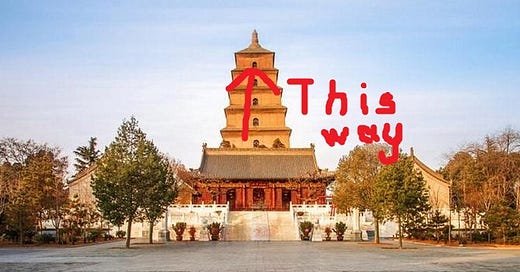Climbing the Tower with Friends at the Temple of Blessings Du Fu (Author's note: Gao Shi and Xue Ju had already produced poems) Its summit sits astride the grey, Where every hour of every day Powerful winds blow. My character does not possess That noble poise and airiness; Its height makes my fear grow. But the power of iconography Points men into mystery, So through the dark we go. We climb in beam and girder shade Round corkscrew turns a dragon made, Or else some serpent’s hole, And emerge to find the Plough pressed near, The Milky Way right by our ear— We hear its astral flow! Then Chu Guangxi exclaims, “Xihe!” Who drives the sun with whip and spur, And I, Shaoling, observe Shaohao Lay autumn on each bush and bough Across the land below. The Qin hills are a fractured sprawl— How different from the solid wall We always used to know; The muddy Jing and crystal Wei, So unalike! Now I can’t say Where does each river flow? Look down and nothing stands out clear: The royal precincts must be here, We cannot see them, though. (The first Tang leader (name taboo) Transferred his power, like Shun to Yu, So we call him that hero.) Turn south and call our founder, Shun, And high above his Cangwu tomb The gloomy storm clouds grow. (Our emperor’s parties reproduce The feats of Mu, who once seduced A goddess, long ago.) How sad, to feast at the Pool of Jade, And see the Kunlun Mountains fade In sunset’s dying glow. Now swans are streaming far away, Their every sad cry seems to say, What safe place can we go? Look! Autumn geese follow the sun. Self-preservation has made them run, Row on ragged row. 杜甫 同诸公登慈恩寺塔 高标跨苍天,烈风无时休。 自非旷士怀,登兹翻百忧。 方知象教力,足可追冥搜。 仰穿龙蛇窟,始出枝撑幽。 七星在北户,河汉声西流。 羲和鞭白日,少昊行清秋。 秦山忽破碎,泾渭不可求。 俯视但一气,焉能辨皇州。 回首叫虞舜,苍梧云正愁。 惜哉瑶池饮,日晏昆仑丘。 黄鹄去不息,哀鸣何所投。 君看随阳雁,各有稻粱谋。
In 752, at the height of the long reign of Emperor Xuanzong, five writers gathered to climb the tallest building in Chang’an. Three of them rhapsodised about the exhilarating height of the tower. One poem was lost. And the other was by Du Fu.
Du hilariously fails to read the room. He starts off at least trying to follow what the others have written. He manages to mention how tall the tower is - but mostly to complain about his vertigo. He manages to insert some supernatural references - though he takes it a bit far by seeming to imply that the actual members of the climbing party are now gods.
The third couplet, in particular, bowls me over. Rather than be excited about the climb, he deadpans that he now finally understands the power of iconography: they saw a big thing pointing upwards, and monkey-see-monkey-do, up they went.
But then, half way through the poem, he takes a sharp left turn, and starts writing gloomy political allegory. This is a striking challenge to what Gao Shi wrote: Gao saw Great Power laid out before him. Du sees dark stormclouds, and flight out of the city. In a few years’ time, Du would in fact be proved right when the An Lushan rebellion brought down the Tang.
Notes:
The Temple of Blessings was a major Buddhist temple in Chang’an. The tower that the poets climbed was built during the early Tang, and is still there, today known as Giant Goose Pagoda.
Xihe was the goddess of the sun. Shaohao was the white emperor of the east, who controlled the season autumn. Du Fu wanted to introduce some mythogical characters; he thought of these characters specifically because Xihe shares a character Xi羲 with Chu Guangxi, and Shaohao shares a character 少 with Du Fu’s chosen nickname 少陵野老 (Wild Old Man of Shaoling).
The rivers Jing and Wei were proverbial because of the contrast in their waters. They’re like chalk and cheese.
The stanzas in italics are inserted by the translator to provide some background to the references. There were strong taboos on directly stating the names of emperors, so many different stand-ins were used in poetry. Often Han emperors were referenced. Here the founder of the Tang dynasty - not an emperor himself, but the first Tang emperor’s father - is referred to as the mythical king Shun. Shun famously refused to pass the crown to his own son and abdicated in favour of the worthiest man he could find, the great Yu. The Tang founder also abdicated and passed power to his son during his lifetime. Because of the taboos, these alternate names for Tang leaders would have been very familiar to Du Fu’s readers.
The legendary King Mu of the Zhou Dynasty once travelled to the western hills, and seduced the Queen Mother of the West beside the Pool of Jade. This was not sad, but a glorious expression of the virile force of the Chinese kings! However, the Tang Emperor Xuanzong had recently decamped with his favourite mistress Yang Guifei up to a spring in the hills to the west of Chang’an. The comparison with King Mu’s sexual adventures was drawn at once, but the real-life trip was viewed with disapproval because Xuanzong was neglecting his duties for the sake of pleasure.




The differences are strike in pronunciation are striking. I will work this into my novella Momentary Lapse of Reason which is set in current day Hong Kong.
I see why he's your favourite. This poem could only have been written by Du.